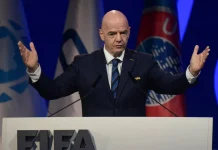It is much more than being the world’s largest football tournament- the FIFA World Cup celebrates unity, diversity, and shared human values. The governing body of global football, FIFA, adheres to some principles enshrined in its statutes respecting human rights, non-discrimination, and inclusivity. Saudi Arabia is all set to host the FIFA World Cup in 2034, raising questions about its suitability as a host nation. Although the Kingdom has achieved different levels of modernization, the bottom line is whether it fits well with the values claimed by FIFA.
Freedom of Expression Suppression
The human rights record of Saudi Arabia has been under the limelight for decades now. Reforms under Vision 2030 do not even change the status quo by continuing to oppress dissenting voices. Most activists, journalists, and critics end up getting heavy sentences as prison terms and execution are not out of the norm.
One of the basics enshrined in the statutes of FIFA is Freedom of Expression, a principle that directly goes against the actions of Saudi Arabia. In 2019, Saudi Arabia had the second-largest number of imprisoned writers and public intellectuals in the world. At least 42 writers were harassed, charged, or imprisoned because of their work.
Women Treatment
While these are positives for women in the kingdom, such as driving and attending sports matches, much remains. 35 percent of women are still dealt with under a guardianship law that confines them, as well as the inability to make their own free choices. The World Cup being held in a country with a long way to go towards gender equality defeats FIFA’s stance on non-discrimination.
Environmental Concerns
Climate and environmental practices add up to the challenge. Saudi Arabia has a desert climate; therefore, temperatures during the traditional World Cup season are unbearably hot. Qatar was able to successfully host the 2022 World Cup through investment in cooling technology, which is far from sustainable.
Saudi Arabia is highly reliant on fossil fuels and makes a very slow transition to renewable sources of energy, which also does not align with the increased attention of FIFA towards sustainability issues. Hosting the world cup would present a big carbon footprint at a time when the world is going towards climate change.
Lack of Inclusiveness and Cultural Challenges
The public behavior laws in Saudi Arabia are quite strict and might quench the festive and celebratory nature that is so characteristic of the World Cup. Fans from every corner of the globe will be there, singing, celebrating, and having the best time, which could contrast with the Kingdom’s rules.
Sportswashing Concerns
This move has been criticized as “sportswashing,” a strategy through which Saudi Arabia will invest in high-profile sports events to improve its global image. The Kingdom has already hosted major events, including Formula 1 races, boxing matches, and the Asian Winter Games, with a human rights record like this.
Critics point out that awarding the World Cup to Saudi Arabia will allow that country to hide its chronic human rights abuses and lack of political freedoms while undermining FIFA’s responsibility towards using football as a positive channel for social change.
FIFA Human Rights Policy
In 2017, FIFA implemented a human rights policy that it harmonized with the United Nations’ Guiding Principles on Business and Human Rights. This means that the host countries should demonstrate that they respect and protect human rights. Considering the background of Saudi Arabia, then it is hard to show that the country aligns fully with those principles.
Risk of Backlash
A move FIFA made in awarding the 2022 World Cup to Qatar was a highly controversial one. It was also plagued by issues over human rights and labor practice. The same is in store for Saudi Arabia: further damage to the reputation and credibility of FIFA, which has been portrayed to be the guardian of the game.
Labor Practices and Migrant Workers
Large numbers of construction projects in Saudi Arabia, especially sports infrastructure, exploit migrant workers who form the backbone. However, there are many tales of exploitation heard from these workers, including minimal wages, poor dwellings, and restraint of freedom. Serious concerns relate to ethics. Qatari labor rights are a rather debated topic.
Thousands of migrant workers were allegedly subjected to maltreatment for making the World Cup. International standards remain way beyond and only partially reformed. 90 percent of the laborers in Saudi Arabia face discrimination. Labor practices in Saudi even now stand nowhere near global standards yet have reached a marginally reformed state. A further cup in the Gulf may establish exploitative tendencies there.
Risk to Legacy of FIFA
Hosting the World Cup in Saudi Arabia would be a long-term outcome for FIFA’s legacy because the organization has already been seen to prioritize profit over principle in previous decisions. Holding the 2034 World Cup in Saudi Arabia will only amplify these criticisms as it may alienate the fans, sponsors, and stakeholders who value social responsibility.
Conclusion
The kingdom may be doing well regarding progress and modernization of and reformation of its economic structure, but on the values adopted by FIFA, there are many failures related to alignment. Some such failures include human rights issues, a lack of inclusivity, environmental concerns, and potential sportswashing issues, which form massive barriers to hosting events like the FIFA World Cup.
It should not compromise these values when it awards the bid to host countries – human rights, sustainability, and inclusiveness. Giving the World Cup to Saudi Arabia in 2034 will not only compromise but also distance FIFA from the greater football family in the world. Hence, if it is committed to its set principles and desires to retain credibility, then handing over the prestigious event of the World Cup to Saudi Arabia demands much contemplation.












